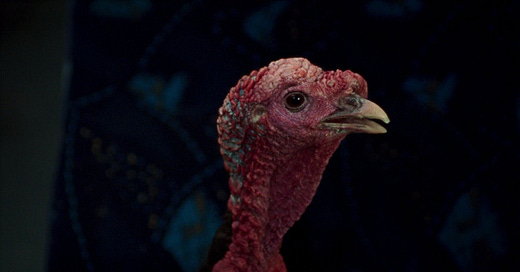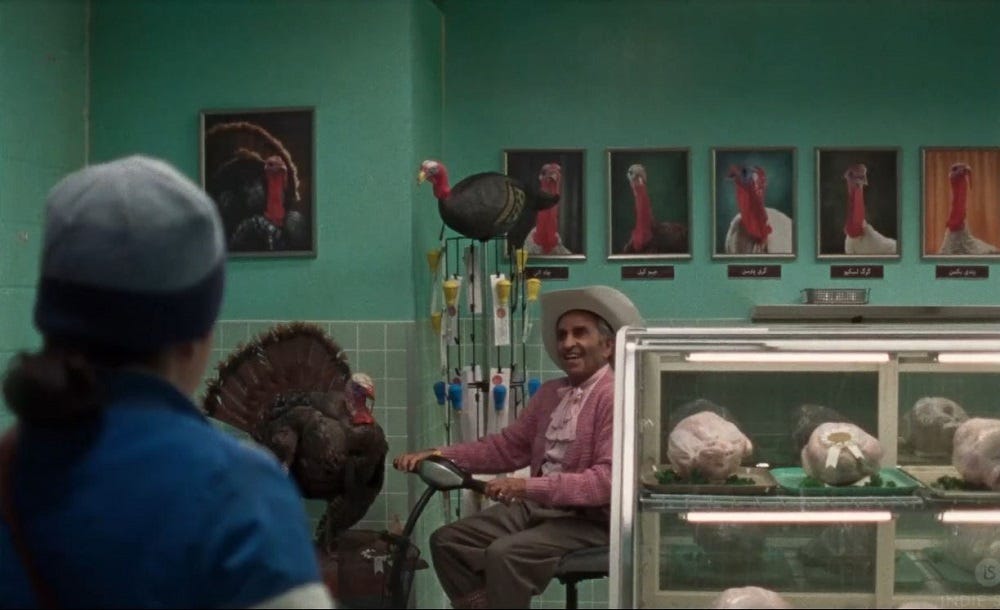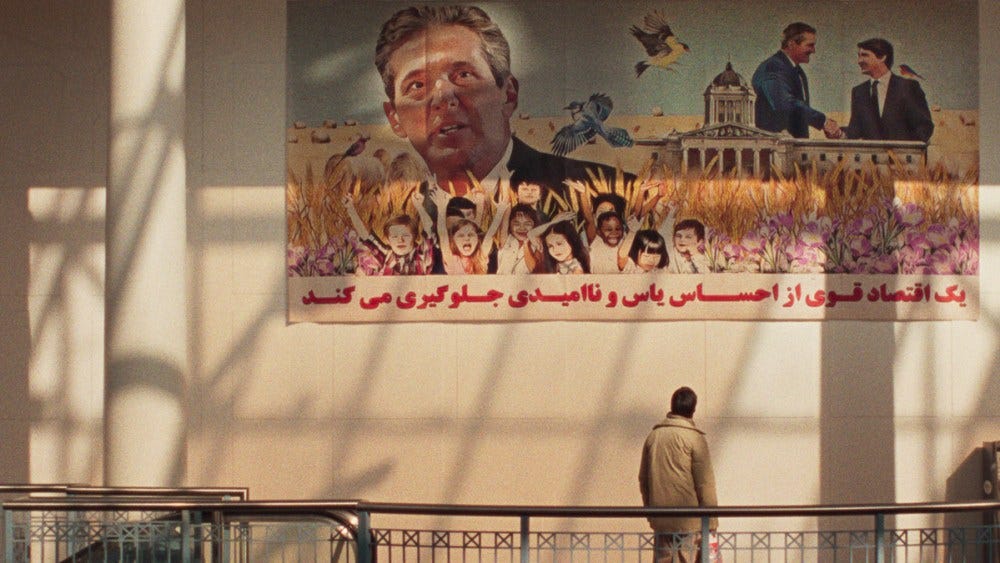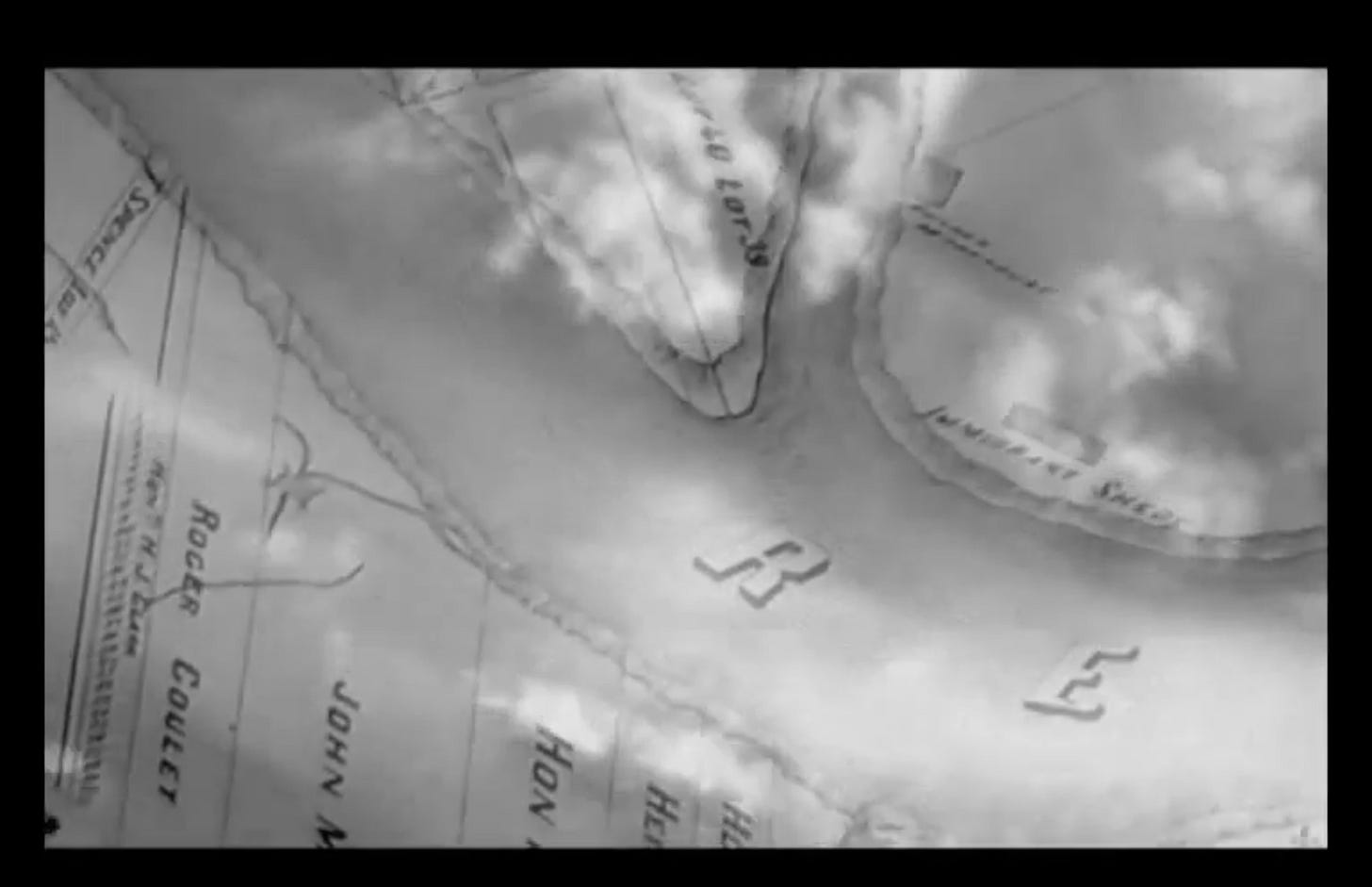Movie Journal: The Song of the Turkey
Two Tales of A City - Rankin and Maddin, and a meeting of the waters...
February 12, 2025 - Angelika Film Center, New York
A verse by Saadi - a translation delivered by Bowinn Ma, Minister of State for Infrastructure, in the British Columbian Parliament:
Human beings are members of a whole In creation, of one essence and soul If one member is inflicted with pain Other members, uneasy will remain If you have no sympathy for human pain The name of human you cannot retain.
This aphorism, Bani Adam, from Gulistan (The Rose Garden), could be an epigram for Universal Language. The film puts this to the test, in content and form, attempting to demonstrate that human cultures are indivisible, commonplace, universal.
The film’s title in Farsi is The Song of the Turkey:
Near the end of the film a character does just that, sing to the turkeys. He sings a poem of Saadi, and does so each night. Rankin told us about the performer using an entire roll of film to sing three poems, how from then on the words of Saadi began to underpin the movie. Universal Language. The Song of the Turkey. Gobble gobble. Are we speaking the same language? Perhaps we are. Perhaps our experiences are fully transmutable between cultures, between starkly different climates, between species.
Universal Language finds an unlikely and entirely original way to pose these questions: staging a Farsi film, heavily influenced by a lineage of Iranian cinema, in Winnipeg, Manitoba. We were lucky enough to have co-writers Matthew Rankin and Ila Firouzabadi at the Angelika for a Q&A, and Rankin expressed the complex cultural confluence that inspired them to make the film.
In describing the genesis of Universal Language, Rankin related a story his grandmother told about finding a two-dollar bill frozen in the icy street – an anecdote which becomes the inciting incident for the film's plot, eventually knitting all its characters together. Rankin then said he discovered a similarity, perhaps a spiritual connection, between his grandmother’s story – from Winnipeg, Manitoba – and the cinematic language and storytelling of Iranian cinema, such as Abbas Kiarostami’s Where is the Friend’s House. It was this spiritual meeting of the waters that led him and his collaborators to develop a film in Farsi set in the beige and grey winter of Winnipeg.
I think it is important for me to paraphrase Matthew Rankin’s paraphrase: Iranian cinema comes out of a thousand years of poetry, and Canadian cinema comes out of forty years of mattress commercials.
“Winnipeg, Winnipeg… Winnipeg. Snowing, sleepwalking, Winnipeg…”
My own impressions of Winnipeg come from Canadian cinema, or at least from Guy Maddin’s cinema – in my mind Winnipeg is at the center of things, the “heart of the heart,” a focal point of global cinema – and now, with a second burgeoning iconoclast, Matthew Rankin following in Maddin’s mold, it really is such a place, that nurtures innovative filmmakers and over time develops its own film language, perhaps like Tehran. Maybe it has something to do with the meeting of the rivers – a place at the center of the map, an unlikely crossroads. Guy Maddin soliloquizes about the primal, maternal powers of those rivers in his My Winnipeg, and Massoud, played by co-writer Pirouz Nemati, references the same rivers in Universal Language, using them as a metaphor for humanity’s interconnectedness – we all flow together. The Assiniboine and the Red rivers – “the forks, the lap…”
But the Winnipeg I know, think I know, is constructed. Two incredible filmmakers, Maddin and Rankin, and scores of art department magicians, have crafted a city of dreams. For Maddin the city was most present in My Winnipeg, a sort of psychosexual city symphony. But it was also the setting of The Saddest Music in the World – in which musicians from across the globe descend on Winnipeg for a chance to win unlimited beer. It is a city of mystery, fantasy, enticing drama and subversive absurdism – and perhaps everyone there speaks Farsi.
Rankin’s first feature, The Twentieth Century, existed in an entirely fabricated world. It was clearly made by a filmmaker trying to get out of Guy Maddin’s influence, and only partly succeeding. Its elaborately stunning sets and compressed spatial reality instantly call back to films like Careful, and Twilight of the Ice Nymphs. It seems to have been made in a kind of creative incubation, like Maddin’s early films, which were built and shot in warehouses and cold storage around Winnipeg. The Twentieth Century might have been shot in the same warehouses and cold storages. But Universal Language is different. It takes place, and is shot, in a Winnipeg rebuilt in the mind. A fictional, but ultimately universal, Winnipeg. It uses existing locations in novel ways, adding signage – like the Farsi Tim Horton’s signs – or adding constructed elements – like a cemetery wedged between freeway overpasses. The creative foundation of the film is stretched in ways I didn’t anticipate. It develops its own internal realism. While films like Twentieth Century and Careful demand that we suspend our disbelief (something I’m all too willing to abide by), Universal Language uses that suspension to play tricks on us. I really found myself asking if Winnipeg weren’t like this, if perhaps there wasn’t really a quadrant of it that could be read only in Farsi. I questioned my own, rather shaky, conception of Manitoba’s capital.
And while Universal Language synthesizes its own style, woven through with Iranian film language, Rankin has actually driven closer toward the ethos of Guy Maddin, perhaps nearing a properly Winnipegian dialect. The two girls, Negin and Nazgol, who start out to rescue the frozen currency, and traipse on a wild-goose (or turkey) chase through the snowy, sleepwalking alleyways of their native Winnipeg – along with the earmuff representative/tour guide of soon-to-be demolished malls, and his wife, the lacrimologist (tear collector) – are recognizable to me. They are of My Winnipeg, Maddin’s Winnipeg. I always sensed that there really was something in the water up there, now I know – it's all about the waters.
But what is – universal language? In one way I think it is this – that a city, a culture, a blending of cultures, can exist in our minds – that we can access the meeting of the waters from anywhere, regardless of our space, by accessing our humanity. In another way I think it speaks to the language of cinema itself, which Rankin admitted during the Q&A was his primary concern. The cinematic language of Iranian film is what inspired him to begin with – perhaps being able to see his grandmother’s story play out as an Abbas Kiarostami film, led him to consider the universal power of cinematic language.
I’d like to visit Winnipeg – Maddin’s, and Rankin’s, and perhaps my own – our own, the universal Winnipeg that exists elsewhere, in the imagination – somewhere along the magnetic tug of two rivers.












Beautiful writing! I have seen both My Winnipeg and Universal Language and continue to be haunted by them. I need to see that Kiarostami film.